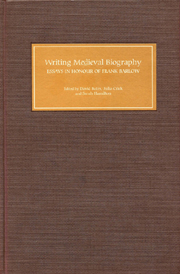Book contents
- Frontmatter
- Contents
- Preface
- List of Abbreviations
- Introduction
- 1 Did Charlemagne have a Private Life?
- 2 Bones for Historians: Putting the Body back into Biography
- 3 ‘Carriers of the Truth’: Writing the Biographies of Anglo-Saxon Female Saints
- 4 Alfred and his Biographers: Images and Imagination
- 5 Re-Reading King Æthelred the Unready
- 6 Writing the Biography of Eleventh-Century Queens
- 7 The Flemish Contribution to Biographical Writing in England in the Eleventh Century
- 8 The Conqueror's Earliest Historians and the Writing of his Biography
- 9 Secular Propaganda and Aristocratic Values: The Autobiographies of Count Fulk le Réchin of Anjou and Count William of Poitou, Duke of Aquitaine
- 10 Reading the Signs: Bernard of Clairvaux and his Miracles
- 11 Arnulf's Mentor: Geoffrey of Léves, Bishop of Chartres
- 12 The Empress Matilda as a Subject for Biography
- 13 The Gesta Stephani
- 14 Writing the Biography of Roger of Howden, King's Clerk and Chronicler
- 15 Writing a Biography in the Thirteenth Century: The Construction and Composition of the ‘History of William Marshal’
- 16 The Strange Case of the Missing Biographies: The Lives of the Plantagenet Kings of England 1154–1272
- Index
16 - The Strange Case of the Missing Biographies: The Lives of the Plantagenet Kings of England 1154–1272
Published online by Cambridge University Press: 12 September 2012
- Frontmatter
- Contents
- Preface
- List of Abbreviations
- Introduction
- 1 Did Charlemagne have a Private Life?
- 2 Bones for Historians: Putting the Body back into Biography
- 3 ‘Carriers of the Truth’: Writing the Biographies of Anglo-Saxon Female Saints
- 4 Alfred and his Biographers: Images and Imagination
- 5 Re-Reading King Æthelred the Unready
- 6 Writing the Biography of Eleventh-Century Queens
- 7 The Flemish Contribution to Biographical Writing in England in the Eleventh Century
- 8 The Conqueror's Earliest Historians and the Writing of his Biography
- 9 Secular Propaganda and Aristocratic Values: The Autobiographies of Count Fulk le Réchin of Anjou and Count William of Poitou, Duke of Aquitaine
- 10 Reading the Signs: Bernard of Clairvaux and his Miracles
- 11 Arnulf's Mentor: Geoffrey of Léves, Bishop of Chartres
- 12 The Empress Matilda as a Subject for Biography
- 13 The Gesta Stephani
- 14 Writing the Biography of Roger of Howden, King's Clerk and Chronicler
- 15 Writing a Biography in the Thirteenth Century: The Construction and Composition of the ‘History of William Marshal’
- 16 The Strange Case of the Missing Biographies: The Lives of the Plantagenet Kings of England 1154–1272
- Index
Summary
IN THE opening words of his Discours sur l'histoire universelle, addressed in 1681 to the French dauphin, Bishop Bossuet states that ‘When history is worthless to other men, it must nonetheless be read to princes.’ The reasons for this, as advanced by Bossuet – in essence, that history serves both as a theatre of moral example from which the prince may learn, and as a means of imposing sense and order upon what might otherwise appear to be the patternless chaos of the past – would have been approved by many classical writers, and were as familiar at the court of the Plantagenet kings of England as they were to become at the Bourbon court of France. Gerald of Wales in his De Principis Instructione (issued in 1216, though much of it composed twenty years previously) declared that ‘The reading of old histories confers no mean benefit upon a lettered prince, for from such reading the prince may learn how to avoid the various outcomes and the uncertain hazard of war, hard or successive falls, as well as secret plots and conspiracies. From past events, and as if from a mirror, instructed by scripture (tanquam ex speculo, scriptura docente), he may consider which such acts to undertake and which to avoid, which to shun and which to pursue.’ From David, via Solomon, Augustus, Charlemagne and Alfred, through to the presentday sage of Highgrove, the connection between the prince and the reading and appreciation of history is undeniably strong.
- Type
- Chapter
- Information
- Writing Medieval Biography, 750–1250Essays in Honour of Frank Barlow, pp. 237 - 258Publisher: Boydell & BrewerPrint publication year: 2006



